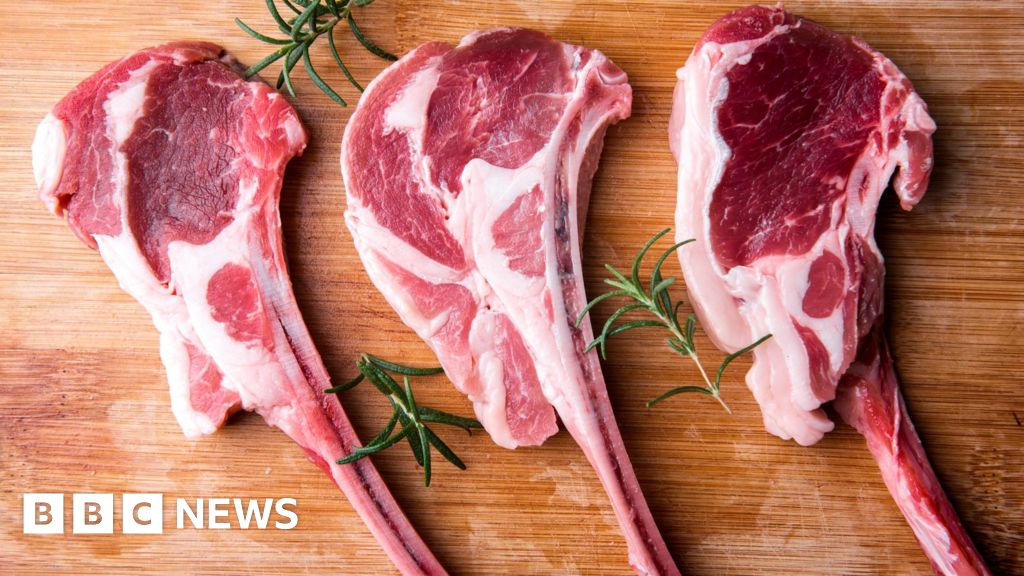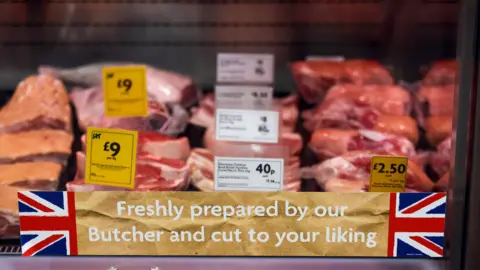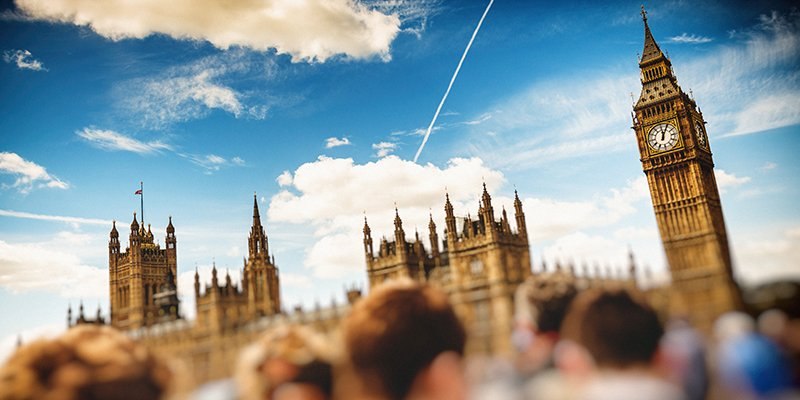You are using an out of date browser. It may not display this or other websites correctly.
You should upgrade or use an alternative browser.
You should upgrade or use an alternative browser.
Brexit Is Teaching Britain A Lesson In Humility; Boris Johnson finalizes EU Exit Deal!
- Thread starter thatrapsfan
- Start date
-
- Tags
- brexit
More options
Who Replied?
Morrisons: Backlash as supermarket trials New Zealand lamb sale
It says the move is due to customer demand for cheaper prices in the wake of the cost of living crisis.
Backlash as Morrisons trials sale of New Zealand lamb
6 days agoFaarea Masud,BBC Business News

Morrisons has received a backlash from angry farmers as it trials the sale of New Zealand lamb instead of 100% British lamb in 39 of its stores.
The supermarket says the move is due to customer demand for cheaper prices.
"The blunt commercial reality is that New Zealand lamb is cheaper to source", it said in a statement, adding that its butchers' counters will still sell British lamb.
The National Farmers Union (NFU) said it was "disappointing" at a time the British livestock industry was under pressure and that New Zealand lamb is "produced to potentially lower standards".
NFU livestock board chair David Barton said he hoped the supermarket dropping its commitment to sell only British lamb was temporary and that the trial would come to an end.
"Recently, the UK farming unions wrote to the chief executive of Morrisons and other top retailers seeking support for the industry including a steadfast commitment to local sourcing in order to maintain food production across the UK and to safeguard our food security", he said.
Meanwhile, the National Sheep Association (NSA) said it was "dismayed and frustrated" by the decision, which "goes against all the principles on which the supermarket has built its reputation amongst the farming community".
But Morrisons said the trial follows an "extensive exercise" listening to customers who "were very clear" that they wanted the supermarket "to sell lamb at a more accessible price all year round".
It added that New Zealand lamb was cheaper to source than British lamb, although the NFU said the meat from overseas comes with "significant food miles".
Mr Barton said that the "unprecedented wet weather" was an "enormous challenge" for British farmers, urging Morrisons to stick to its 100% British lamb commitment.
Morrisons said: "We do not intend this move to mean a reduction in the overall volumes of lamb that we buy directly from British farmers."
It added that New Zealand lamb will be clearly labelled so customers in the stores participating in the trial can "make a choice".
NSA chief executive Phil Stocker said: "We learnt of this disappointing news whilst returning from the Field to Fork Summit held yesterday with Prime Minister Rishi Sunak at 10 Downing Street."
He described it as an event "that was designed to show support for UK agriculture and where the supermarket itself had a presence promoting its commitment to British farmers."
"So, the timing of this announcement is really quite unbelievable", he added.
Mr Stocker said that UK sheep farmers received "strong prices" because of their high standards, and that the "realistic prices" provided much needed money for re-investment in to their farms in the wake of the Schmallenberg virus causing losses on many farms, and the threat of Bluetongue - an insect-borne viral disease.
Morrisons announced in March that it had made a loss of more than £1bn last year, driven by soaring financing costs as the firm's debt also grew.
The losses come at a time customers' housing budgets are squeezed in the face of the cost of living crisis, which according to major supermarkets has changed shopping habits for good, as people seek out cheaper products.
No wayyyyyyy
Morrisons: Backlash as supermarket trials New Zealand lamb sale
It says the move is due to customer demand for cheaper prices in the wake of the cost of living crisis.www.bbc.com
Backlash as Morrisons trials sale of New Zealand lamb
6 days ago
Faarea Masud,BBC Business News
Getty Images
Morrisons has received a backlash from angry farmers as it trials the sale of New Zealand lamb instead of 100% British lamb in 39 of its stores.
The supermarket says the move is due to customer demand for cheaper prices.
"The blunt commercial reality is that New Zealand lamb is cheaper to source", it said in a statement, adding that its butchers' counters will still sell British lamb.
The National Farmers Union (NFU) said it was "disappointing" at a time the British livestock industry was under pressure and that New Zealand lamb is "produced to potentially lower standards".
NFU livestock board chair David Barton said he hoped the supermarket dropping its commitment to sell only British lamb was temporary and that the trial would come to an end.
"Recently, the UK farming unions wrote to the chief executive of Morrisons and other top retailers seeking support for the industry including a steadfast commitment to local sourcing in order to maintain food production across the UK and to safeguard our food security", he said.
Meanwhile, the National Sheep Association (NSA) said it was "dismayed and frustrated" by the decision, which "goes against all the principles on which the supermarket has built its reputation amongst the farming community".
But Morrisons said the trial follows an "extensive exercise" listening to customers who "were very clear" that they wanted the supermarket "to sell lamb at a more accessible price all year round".
It added that New Zealand lamb was cheaper to source than British lamb, although the NFU said the meat from overseas comes with "significant food miles".
Mr Barton said that the "unprecedented wet weather" was an "enormous challenge" for British farmers, urging Morrisons to stick to its 100% British lamb commitment.
Morrisons said: "We do not intend this move to mean a reduction in the overall volumes of lamb that we buy directly from British farmers."
It added that New Zealand lamb will be clearly labelled so customers in the stores participating in the trial can "make a choice".
NSA chief executive Phil Stocker said: "We learnt of this disappointing news whilst returning from the Field to Fork Summit held yesterday with Prime Minister Rishi Sunak at 10 Downing Street."
He described it as an event "that was designed to show support for UK agriculture and where the supermarket itself had a presence promoting its commitment to British farmers."
"So, the timing of this announcement is really quite unbelievable", he added.
Mr Stocker said that UK sheep farmers received "strong prices" because of their high standards, and that the "realistic prices" provided much needed money for re-investment in to their farms in the wake of the Schmallenberg virus causing losses on many farms, and the threat of Bluetongue - an insect-borne viral disease.
Morrisons announced in March that it had made a loss of more than £1bn last year, driven by soaring financing costs as the firm's debt also grew.
The losses come at a time customers' housing budgets are squeezed in the face of the cost of living crisis, which according to major supermarkets has changed shopping habits for good, as people seek out cheaper products.
Brexit was supposed to prevent thiiiiiisssss.

DrBanneker
Space is the Place
So how are GE polls looking?
I swear if you re-elect the Tories your electorate is crazier than MAGA since at least Trump supporters here can blame Biden for the last 4 years. Tories been at the wheel forever at this point.
I swear if you re-elect the Tories your electorate is crazier than MAGA since at least Trump supporters here can blame Biden for the last 4 years. Tories been at the wheel forever at this point.
Tribaligenesis
All Star
General election likely to be called for July.
So how are GE polls looking?
I swear if you re-elect the Tories your electorate is crazier than MAGA since at least Trump supporters here can blame Biden for the last 4 years. Tories been at the wheel forever at this point.

How is Britain voting as the 2024 general election campaign begins? | YouGov
The Conservatives have a mountain to climb, with support low even among their traditional supporters
Only the over-70s now tend to support the Conservatives, although even here just 39% say they will back the party. This is down from 67% in 2019, with Labour growing their vote share among the oldest Britons from 14% to 25%.
Reform UK also finds more support among older age groups, gathering 20% of the vote among Britons over-60.
It's officially the party of
 and even then Reform UK is cutting into their potential pool of voters
and even then Reform UK is cutting into their potential pool of voters 
IIRC David Cameron promised the Brexit referendum partly due to fears of a similar scenario - losing seats to a smaller, more, erm, "patriotic" party - back then it was UKIP. But there are no more tricks to pull this time.
Cameron chose to commit to a vote, not because the country’s population was clamouring for one but because a significant minority of his own MPs, many of them frustrated by the constraints of coalition, were demanding that he do so – some because they feared that UKIP would cost them their seat (or the seats of too many of their colleagues) at the next election, some because they wanted out of the European Union and were more than happy to leverage that fear to their advantage.
lt's quite unlikely that Labour will lose: Labour has 99% chance of forming next government, says elections expert – as it happened
But I am concerned that they may not be able to stop the rot or improve things enough to stay in for more than one term...
DrBanneker
Space is the Place
Yeah I am sure Suella and others will be straight unhinged as the opposition.
How is Britain voting as the 2024 general election campaign begins? | YouGov
The Conservatives have a mountain to climb, with support low even among their traditional supportersyougov.co.uk
It's officially the party ofand even then Reform UK is cutting into their potential pool of voters
IIRC David Cameron promised the Brexit referendum partly due to fears of a similar scenario - losing seats to a smaller, more, erm, "patriotic" party - back then it was UKIP. But there are no more tricks to pull this time.
lt's quite unlikely that Labour will lose: Labour has 99% chance of forming next government, says elections expert – as it happened
But I am concerned that they may not be able to stop the rot or improve things enough to stay in for more than one term...
the next guy
Superstar

There’s a huge, Brexit-shaped hole in this election – that’s why there’s such an air of unreality about it | Nesrine Malik
The disconnect between promises and the material lives of voters that opened up in the referendum has not been repaired, says Guardian columnist Nesrine Malik
I really enjoy Nesrine's articles
Honestly I could have just bolded the whole thing lolRemember Brexit? For a topic that dominated several years of British political life after 2016, and the last general election, its near-total absence from this one is remarkable. Brexit did not come up once in the BBC leaders’ debate between Rishi Sunak and Keir Starmer. It did once in the seven-way debate on Friday, raised by the SNP’s Stephen Flynn, who described it as an unmitigated disaster. The silence is beginning to feel less like omission than an act of collective repression.
Between the Tories and Labour there is a silent agreement, perfectly observed in the English tradition of avoiding uncomfortable conversations. It is increasingly jarring. Brexit’s consequences are now part and parcel of our layered crises. It features in the cost of living crisis – it has driven up inflation, accounting for a third of food-price inflation since 2019, according to an LSE paper. It lurks in the labour market, where higher immigration from outside the EU has not plugged a shortfall of hundreds of thousands of EU workers. It holds back growth, clobbering small businesses and choking bigger ones desperate for labour. As was the conclusion of a report this year summarised by London mayor Sadiq Khan: “The hardline version of Brexit we’ve ended up with is dragging our economy down.”
The Tories naturally have no interest in discussing any of this, and Labour is wary of raising the effects of Brexit lest they open themselves up to the charge of questioning the “will of the people”. The result is that the referendum and its continuing aftermath are being treated like a mortifying family secret. What a corrosive influence it has had. Its seductive, empowering idea of “taking back control” has been displaced on to an exhausting fixation with small boats crossing the Channel, which has engulfed our politics and given us nothing but even more bickering about high immigration. Its main stars and protagonists have disbanded, fallen out and been disgraced, and the party they belonged to rent asunder by the whole adventure. Nigel Farage, meanwhile, is back.
Crucially, the spirit of Brexit still runs our politics. Not in its pugnaciousness, big claims and large personalities, but in the pretence that there is a magic bullet for the country’s problems that will work without addressing any of our fundamental economic and political arrangements. Brexit was a way to divert grievance away from the domestic and on to a foreign bogeyman. The reality was that Britain’s major problems were authored at home. These include a system that is based on the disfranchisement of millions through regional inequality, paltry investment in infrastructure and skills to offset deindustrialisation, a concentration of political and economic power in the capital, the weakening of labour rights, and the defunding of state services and education subsidies that enable people to prosper.
Actually reversing these trends would involve policies that seem to be forbidden. We cannot nationalise poorly run public utilities. We cannot better tax wealth and capital gains and invest the proceeds. We cannot be honest about the fact that we need immigration for everything from funding universities to social care. When Sunak and Starmer pitch their allegedly transformative agendas without any of these potential solutions, they invoke the spirit of Brexit – selling change they cannot deliver.
Then they offer more magical thinking. Sunak holds the electorate to ransom over Rwanda deportations as if they were some absolutely crucial breakthrough. Labour tells us that the country’s myriad economic problems are because of post-Covid state finances that we can do nothing about but which will be vanquished by “growth” and “efficiency”. Both tell us that immigration is too high but do not mention the colossal spending that will be required to wean the country off it. It is all broadly theatre because there is an electric fence, erected by the rightwing media and political consensus, around the policies that will bring about the sort of change that both parties are promising.
When the political mainstream feels so narrow, is it any wonder that Brexit was so beguiling? Not just to Brexiters but to remainers as well, who expended much energy campaigning for a second referendum. It was a useful displacement for them, too, to project on to Brexit the country’s very undoing. Better to focus instead not on the legacy of decades of Thatcherite consensus on deregulation, privatisation, our asset-driven economy and the abandonment of regional planning and industrial strategy, but on Brexit as a supremely corrosive event. And then, when it all predictably came to nought, better to pivot to lamenting the state of the country and focusing on the spectator sport of Tory malfeasance.
This is why the overriding sense of this election is that of disembodiment, of the separation of our material lives from political events. There is breathless talk of the gaffes, the interviews, the debates and the memes. And yet it feels like there is little connection other than registering that they are happening. It is a quality that characterises a weak political culture – a constant state of high action and no momentum, like cycling furiously on a stationary bike.
It all reminds me of a thought from EM Forster’s A Passage to India, a novel with a traumatic event at its heart that is never fully resolved for the reader. Towards the end, an Englishman working in colonial India takes stock of his performance during the episode, and of his whole life so far, and finds the moment profoundly unsatisfying. “He experienced nothing himself,” Forster writes. “He felt he ought to have been working at something else the whole time – he didn’t know at what, never would know, never could know, and that was why he felt sad.”
If this election all feels a bit flat, a bit sad, it’s because we ought to have been working on something else the whole time.
And the disembodiment... I think I feel it. I am so disengaged from the pageantry of this election, partially(?) as a result of the astounding lack of progress following the last election. I am literally just waiting for the day (which I keep re-realising is next week)...
1/1
Every word of this is the truth...
To post tweets in this format, more info here: https://www.thecoli.com/threads/tips-and-tricks-for-posting-the-coli-megathread.984734/post-52211196
Every word of this is the truth...
To post tweets in this format, more info here: https://www.thecoli.com/threads/tips-and-tricks-for-posting-the-coli-megathread.984734/post-52211196



